mimi’s brief in icm_class-1 was:
Create a “self” portrait using 2D primitive shapes. Play with symmetry in your portrait. Shapes include – arc(), curve(), ellipse(), line(), point(), quad(), rect(), triangle() – and basic color functions – background(), colorMode(), fill(), noFill(), noStroke(), stroke(). Remember to use createCanvas() to specify the dimensions of your window and wrap all of your code inside a setup() function. Here’s an example: Zoog
i wanted to play.
the world is made up of many (points).
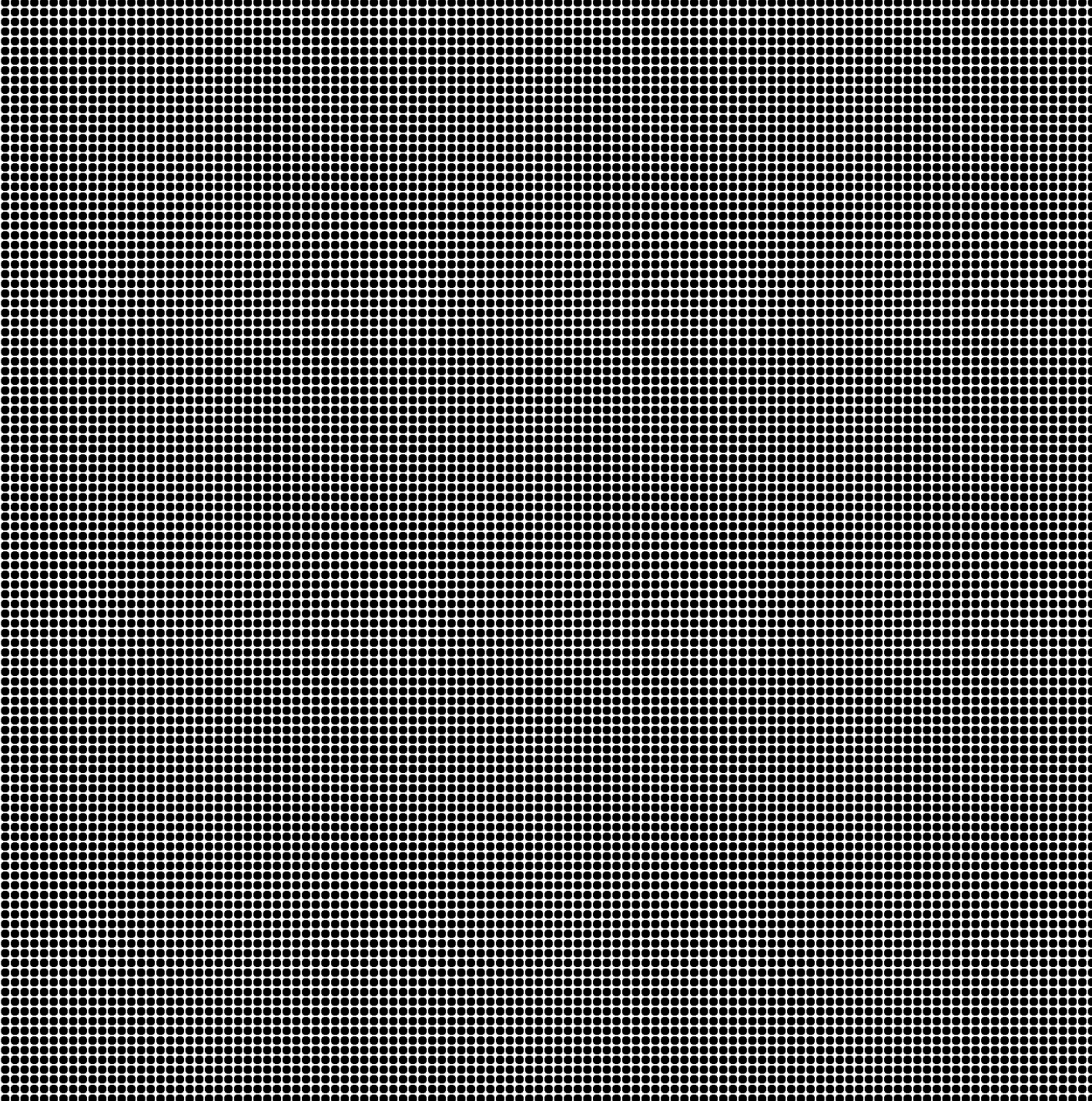
//the size of the world:
let world_width = 800;
let world_height = 800;
//the world is made up of many people:
let people = [];
//they're all of the same size:
const size = 6;
function setup() {
//the world is born:
createCanvas(world_width, world_height);
//people are born in the world:
const space = size +1; // people give each other some space.
for (let x = 0 + size; x <= world_width - size; x += space) {
for (let y = 0 + 4; y <= world_height - 4; y += space) {
people.push(new People(x, y));
}
}
}
function draw() {
//each person:
for (person of people) {
//exists:
person.exist();
}
}they move — often to take someone’s place, or be in someone else’s space.
function draw() {
background(cols[0]);
//each person:
for (person of people) {
//exists:
person.exist();
//moves:
person.move();
}
//people move to take someone's place, or be in someone's space.
let moving_person = people[int(random(0, people.length))];
let static_person = people[int(random(0, people.length))]; //sometimes, the moving and the stationary person are the same. this means you're happy where you are. that's humanely (and probabilistically) rare.
moving_person.destination_x = static_person.x;
moving_person.destination_y = static_person.y;
}
class People {
constructor(x, y, col = [0, 0, 0, 255]) {
this.x = x;
this.y = y;
this.size = size;
this.col = col;
//people have temporary destinations:
// but when they're born, those destinations don't exist.
(this.destination_x = x), (this.destination_y = y);
}
exist() {
strokeWeight(size);
stroke(this.col);
point(this.x, this.y);
}
move() {
this.x = lerp(this.x, this.destination_x, 0.01);
this.y = lerp(this.y, this.destination_y, 0.01);
}
}they’re always moving, especially in new-york. it’s chaotic.
function draw() {
// background(cols[0]);
}somewhere between all this, is me. perhaps i am lost, in the movement of the crowd; or there are people who carry little parts of me in the world.
either way — the parts of my ‘self’ are lost, inconsequential, and small; and i wait to be whole again.
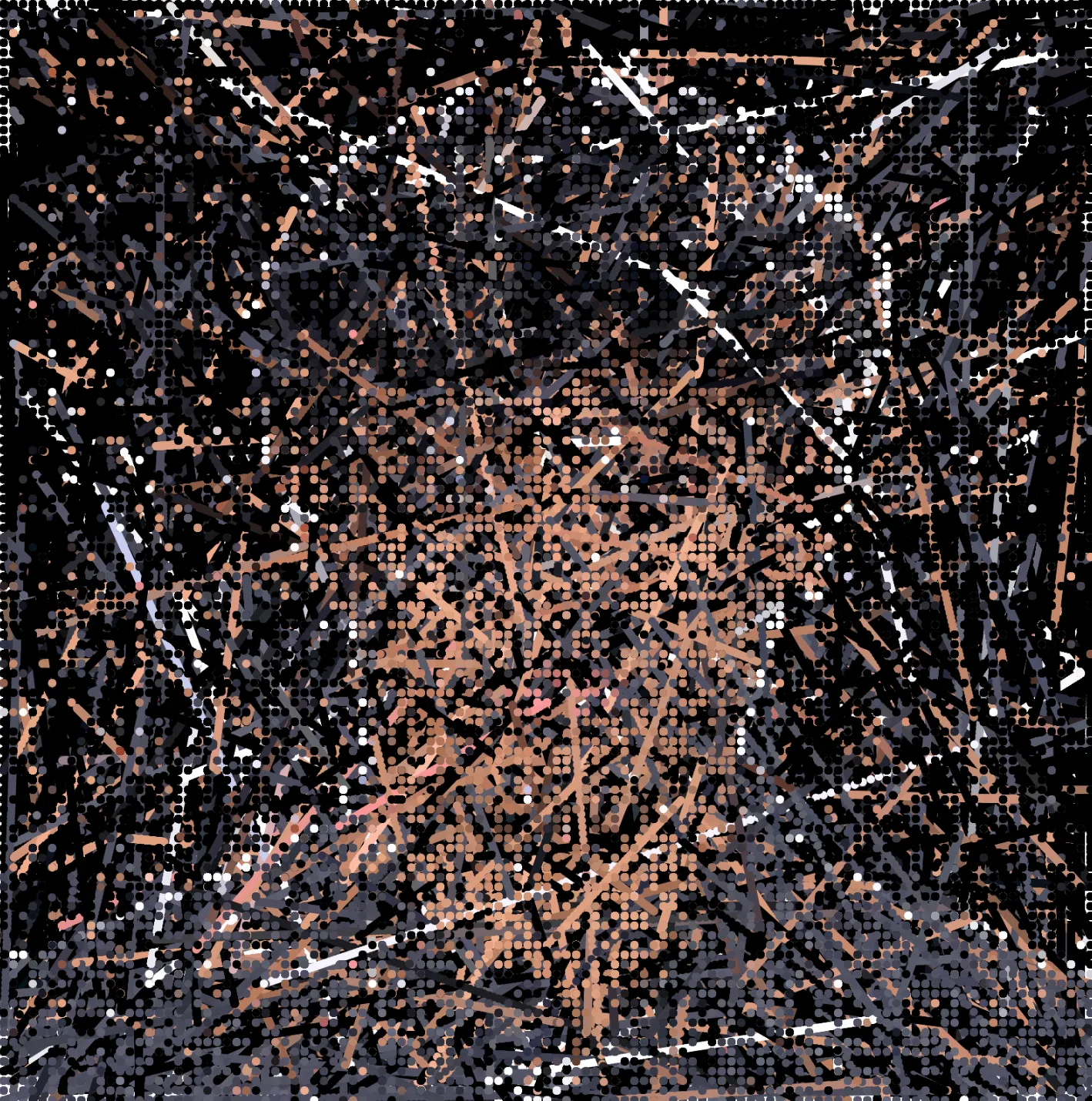
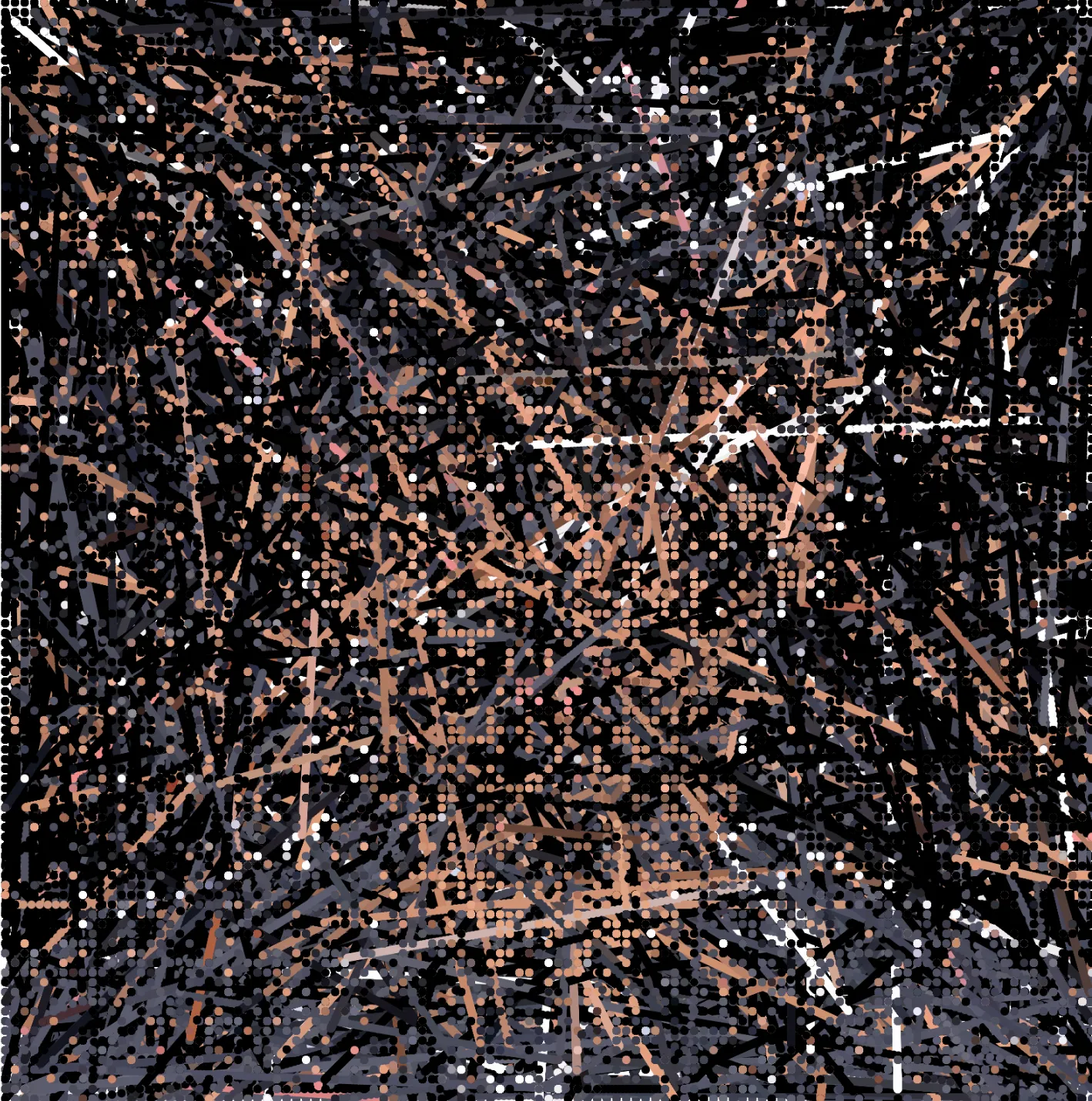
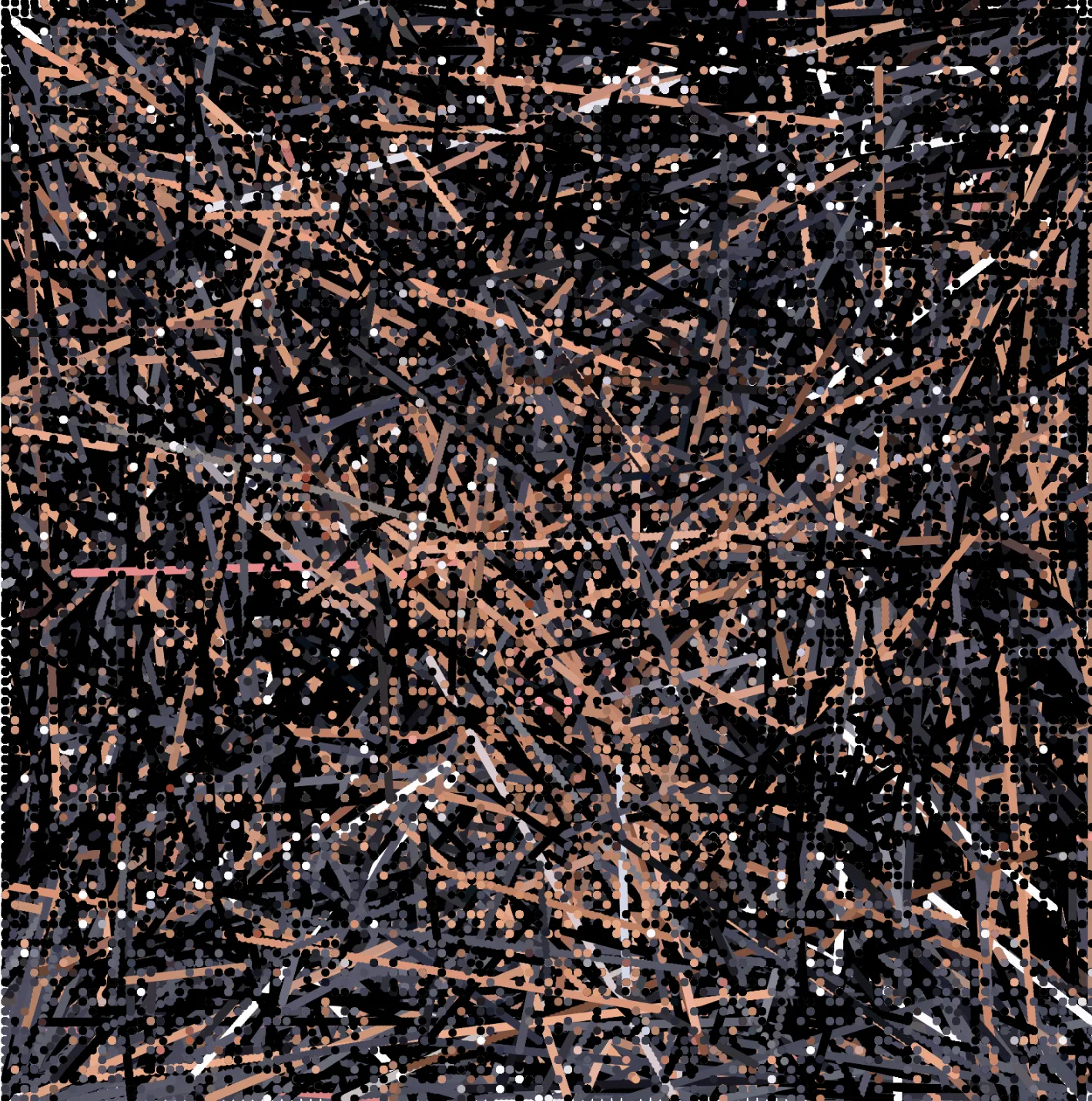
code for the above:
//self-portrait; september 05, 2025.
//use colours from my website:
let cols = [
[253, 253, 253], //bg
[60, 60, 60], //primary
[120, 120, 120], //secondary
[240, 240, 240], //tertiary
];
//the size of the world:
let world_width = 800;
let world_height = 800;
//the world is made up of many people:
let people = [];
//they're all of the same size:
const size = 6;
let photograph; //to use picture later.
//to preload the image, through which people get colour:
function preload() {
photograph = loadImage("/assets/sq_passport-photo.jpg");
}
function setup() {
//the world is born:
createCanvas(world_width, world_height);
//don't need stroke.
noStroke();
//get colours from the photograph once:
get_colours_from_img(photograph);
//people are born in the world:
const space = size + 1; // people give each other some space.
for (let x = 0 + size; x <= world_width - size; x += space) {
for (let y = 0 + 4; y <= world_height - 4; y += space) {
// //i also want to push the colours of my image here. so:
let col = convert_coordinates_to_colour(x, y, photograph);
// //check and swap white for black.
if (col[0] == 255 && col[1] == 255 && col[2] == 255) {
col = [0, 0, 0];
}
people.push(new People(x, y, col));
}
}
}
//helper function to get colours from an image in 'pixels' array.
function get_colours_from_img(img) {
img.resize(0, width); //fit the width of the screen.
image(img, 0, 0); //draw from the top-left.
img.loadPixels();
background(cols[0]);
}
//helper function to convert coordinates to colours, as passed down in setup.
function convert_coordinates_to_colour(x, y, img) {
let index = (y * img.width + x) * 4;
let r = img.pixels[index];
let g = img.pixels[index + 1];
let b = img.pixels[index + 2];
let a = img.pixels[index + 3];
return [r, g, b, a];
}
function draw() {
// background(cols[0]);
//each person:
for (var person of people) {
//exists:
person.exist();
//moves:
person.move();
}
//people move to take someone's place, or be in someone's space.
let moving_person = people[int(random(0, people.length))];
let static_person = people[int(random(0, people.length))]; //sometimes, the moving and the stationary person are the same. this means you're happy where you are. that's humanely (and probabilistically) rare.
moving_person.destination_x = static_person.x;
moving_person.destination_y = static_person.y;
}
class People {
constructor(x, y, col = [0, 0, 0, 255]) {
this.x = x;
this.y = y;
this.size = size;
this.col = col;
//people have temporary destinations:
// but when they're born, those destinations don't exist.
this.destination_x = x;
this.destination_y = y;
}
exist() {
strokeWeight(size);
stroke(this.col);
point(this.x, this.y);
}
move() {
this.x = lerp(this.x, this.destination_x, 0.01);
this.y = lerp(this.y, this.destination_y, 0.01);
}
}
new technical things:
explored img.get vs img.pixels this time. img.pixels is faster, and used if the number of pixels are high. so, i’ll use that.
img.pixels is a one-dimensional array (to make it faster). this means that it’s a giant array of rgba values of each pixel; i.e:
// for the first pixel, where x=0, y=0:
img.pixels[0]; //red value.
img.pixels[1]; //green value.
img.pixels[2]; //blue value.
img.pixels[3]; //alpha value.
img.pixels[4] //this would be the red value for the next pixel (1,0).img.loadPixels must be called once, and then the colours can be assigned (in my use-case). i wrote a couple of helper functions to load colors, and then convert colors for an x, y coordinate.
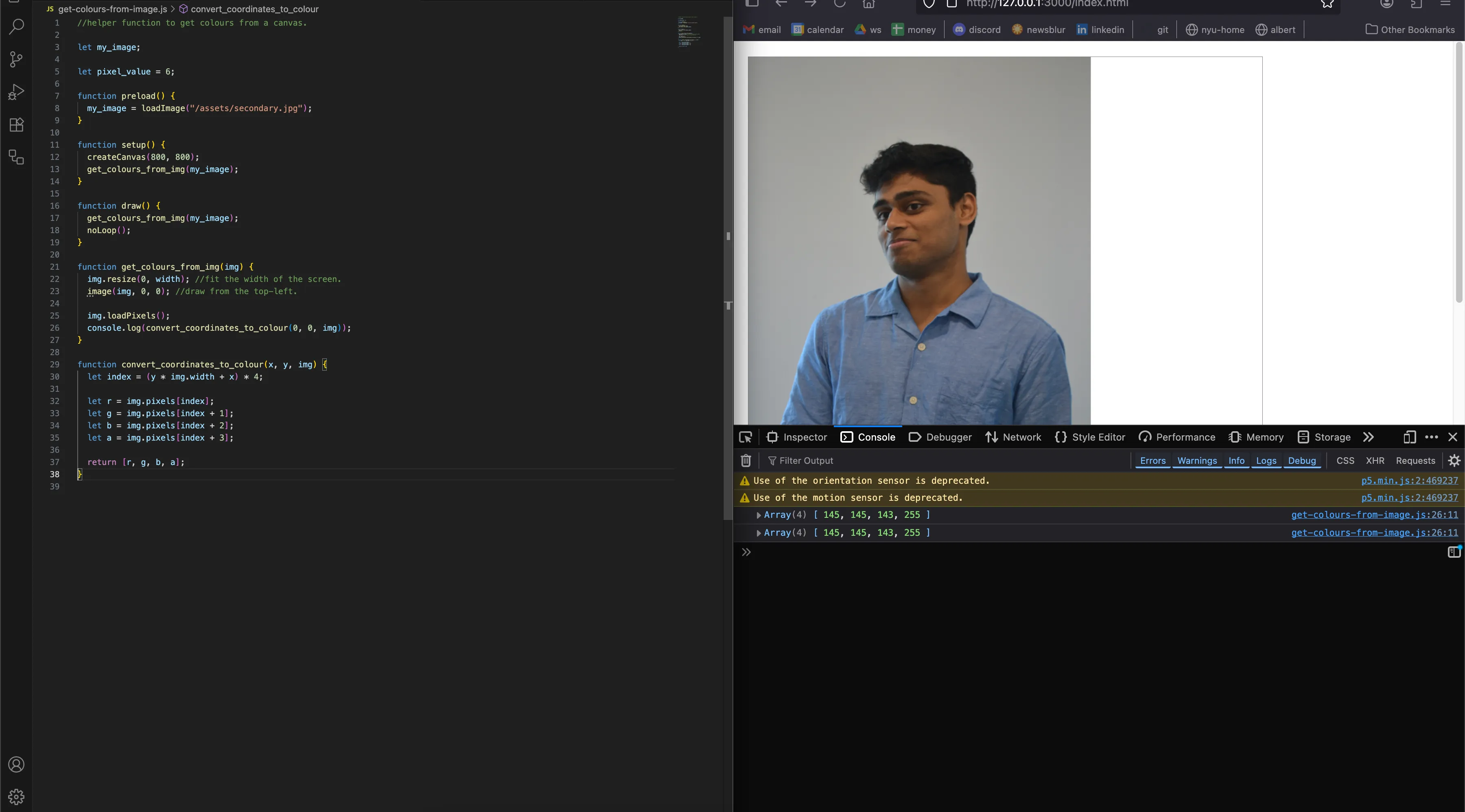
cool outputs during the process:
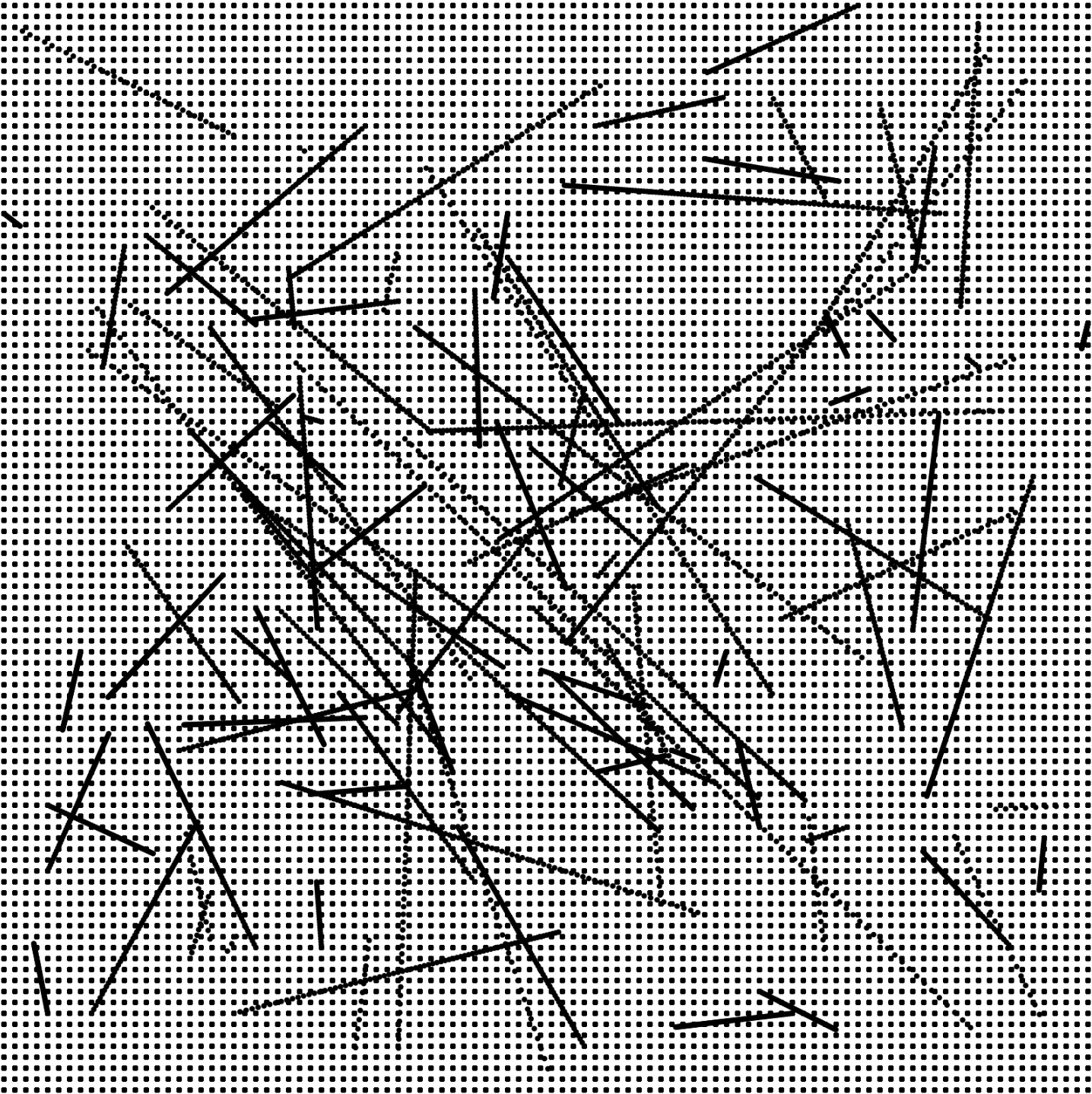
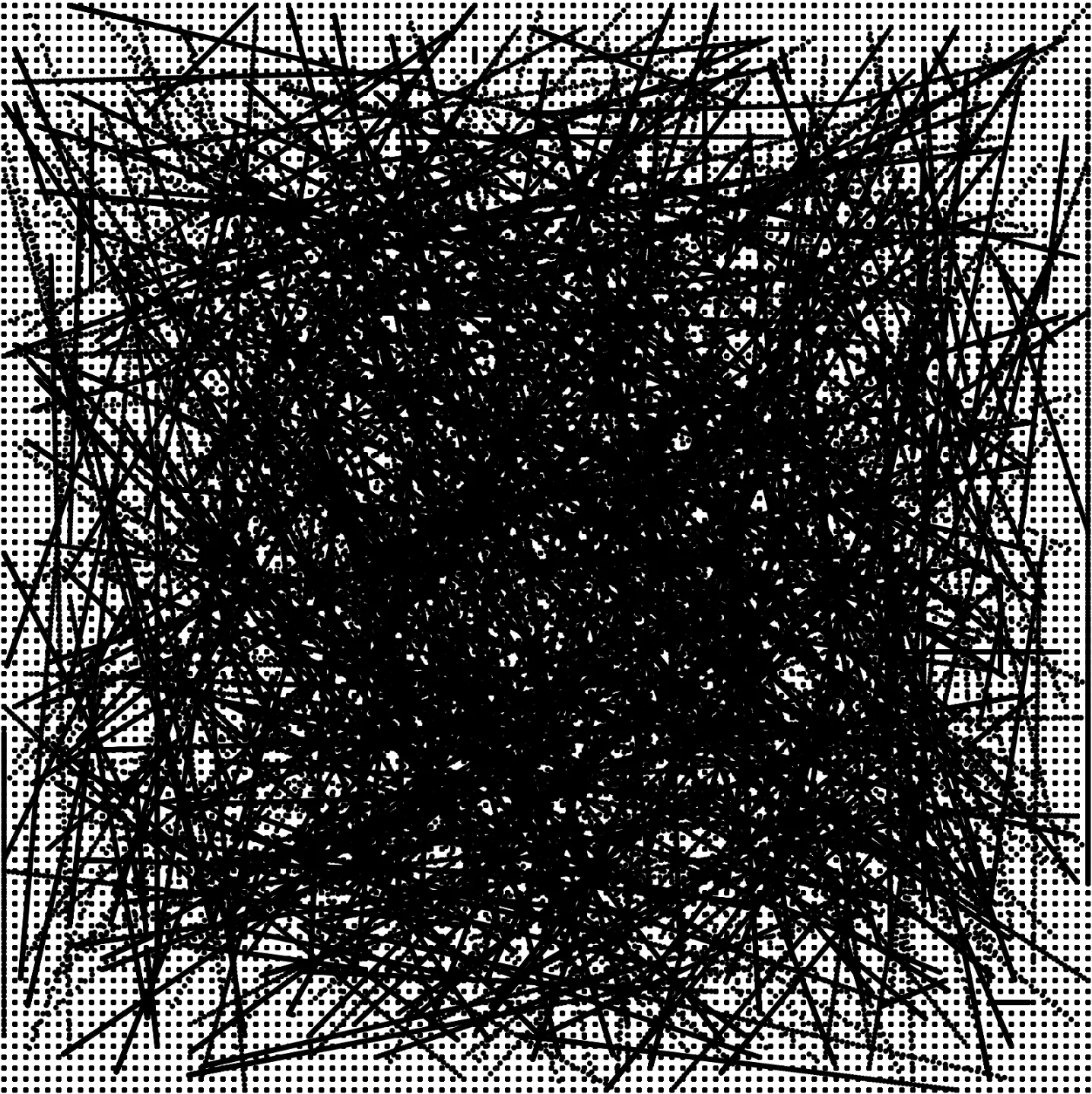
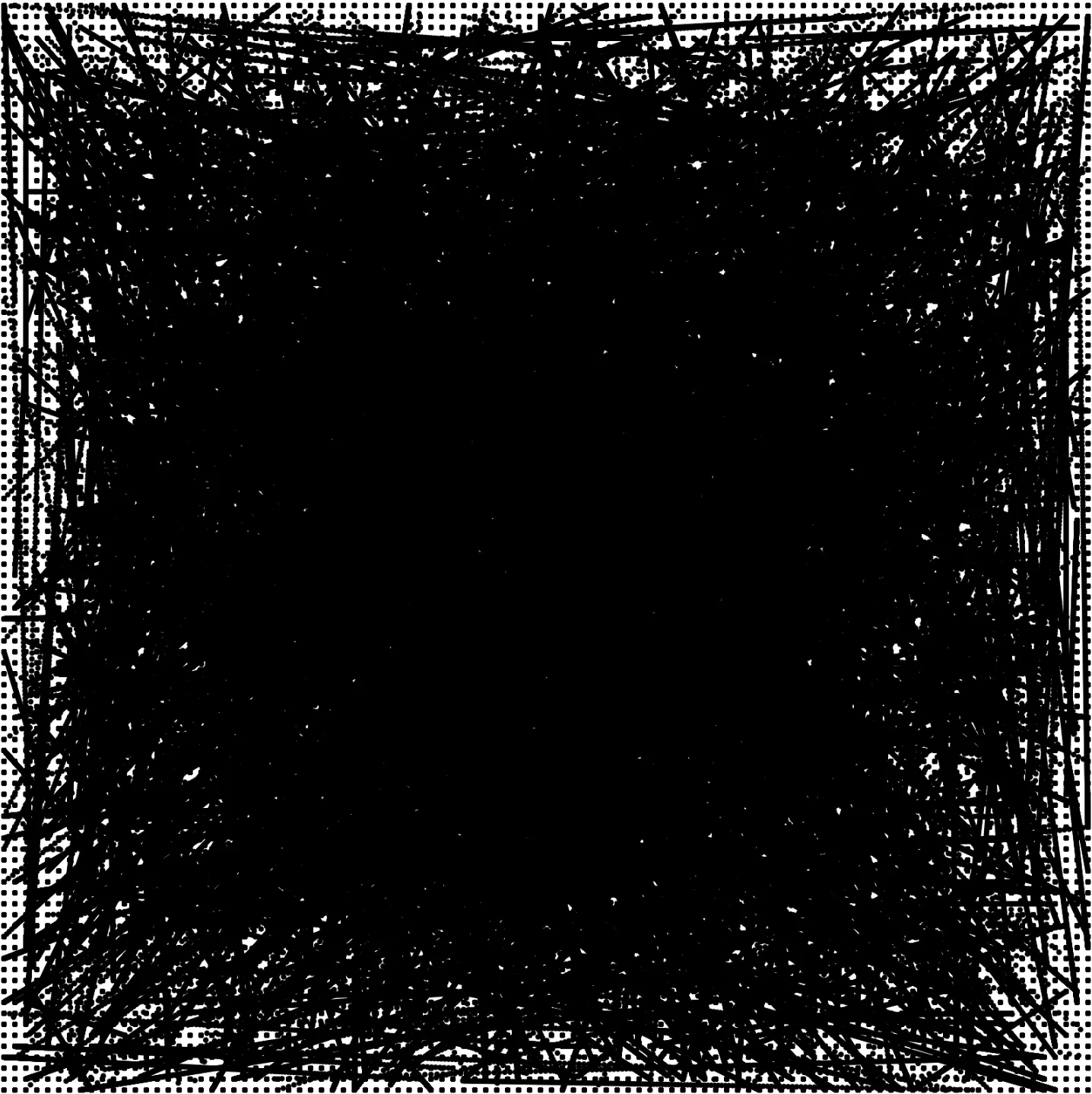
code:
//self-portrait; september 05, 2025.
//use colours from my website:
let cols = [
[253, 253, 253], //bg
[60, 60, 60], //primary
[120, 120, 120], //secondary
[240, 240, 240], //tertiary
];
//the size of the world:
let world_width = 800;
let world_height = 800;
//the world is made up of many people:
let people = [];
//they're all of the same size:
const size = 4;
function setup() {
//the world is born:
createCanvas(world_width, world_height);
//people are born in the world:
const space = size * 2; // people give each other some space.
for (let x = 0 + size; x <= world_width - size; x += space) {
for (let y = 0 + 4; y <= world_height - 4; y += space) {
people.push(new People(x, y));
}
}
}
function draw() {
// background(cols[0]);
//each person:
for (person of people) {
//exists:
person.exist();
//moves:
person.move();
}
//people move to take someone's place, or be in someone's place.
let moving_person = people[int(random(0, people.length))];
let static_person = people[int(random(0, people.length))]; //sometimes, the moving and the stationary person are the same. this means you're happy where you are. that's humanely (and probabilistically) rare.
moving_person.destination_x = static_person.x;
moving_person.destination_y = static_person.y;
}
class People {
constructor(x, y, col = 0) {
this.x = x;
this.y = y;
this.size = size;
this.col = col;
//people have temporary destinations:
// but when they're born, those destinations don't exist.
(this.destination_x = x), (this.destination_y = y);
}
exist() {
strokeWeight(size);
stroke(this.col);
point(this.x, this.y);
}
move() {
this.x = lerp(this.x, this.destination_x, 0.01);
this.y = lerp(this.y, this.destination_y, 0.01);
}
}
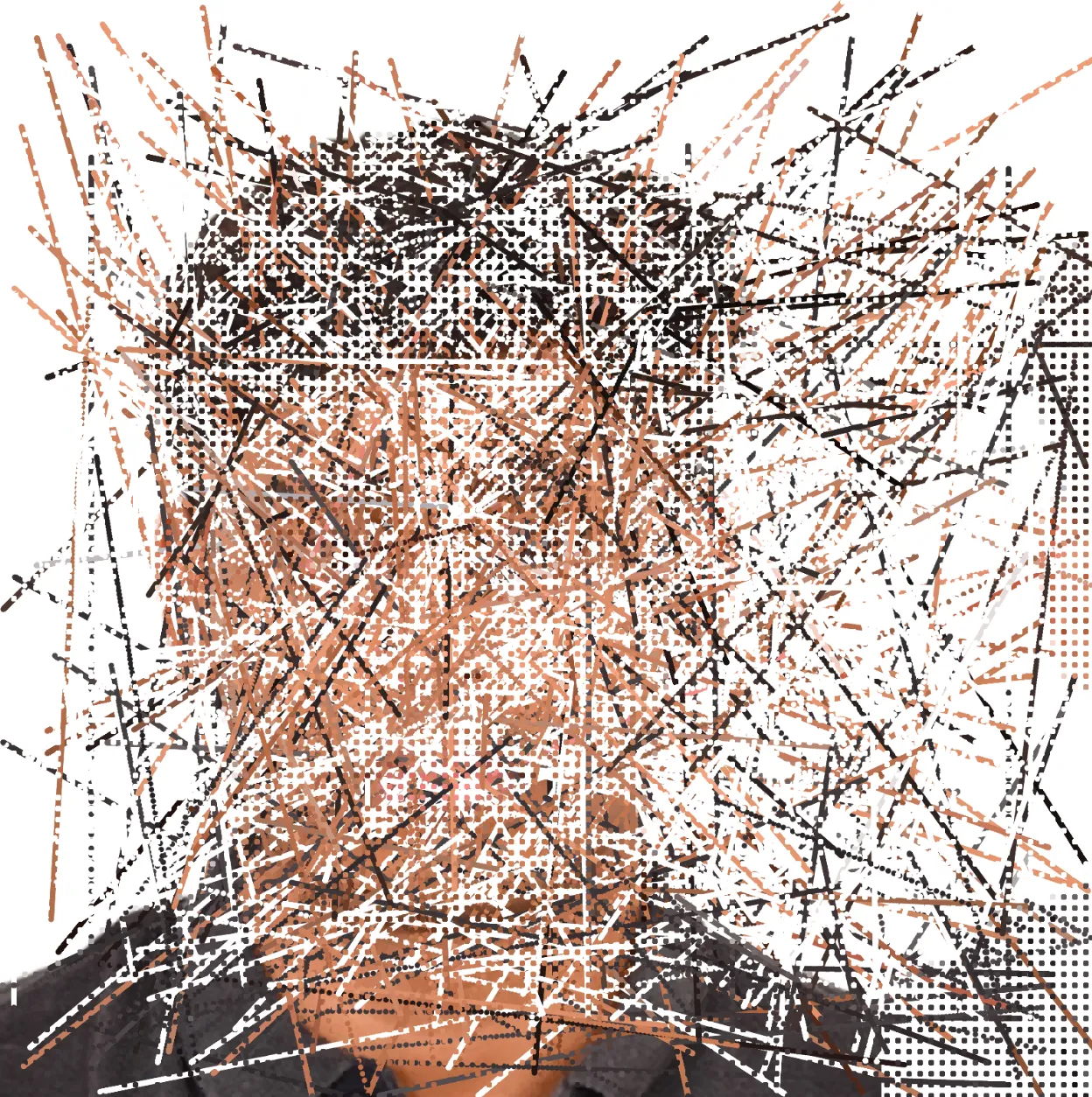
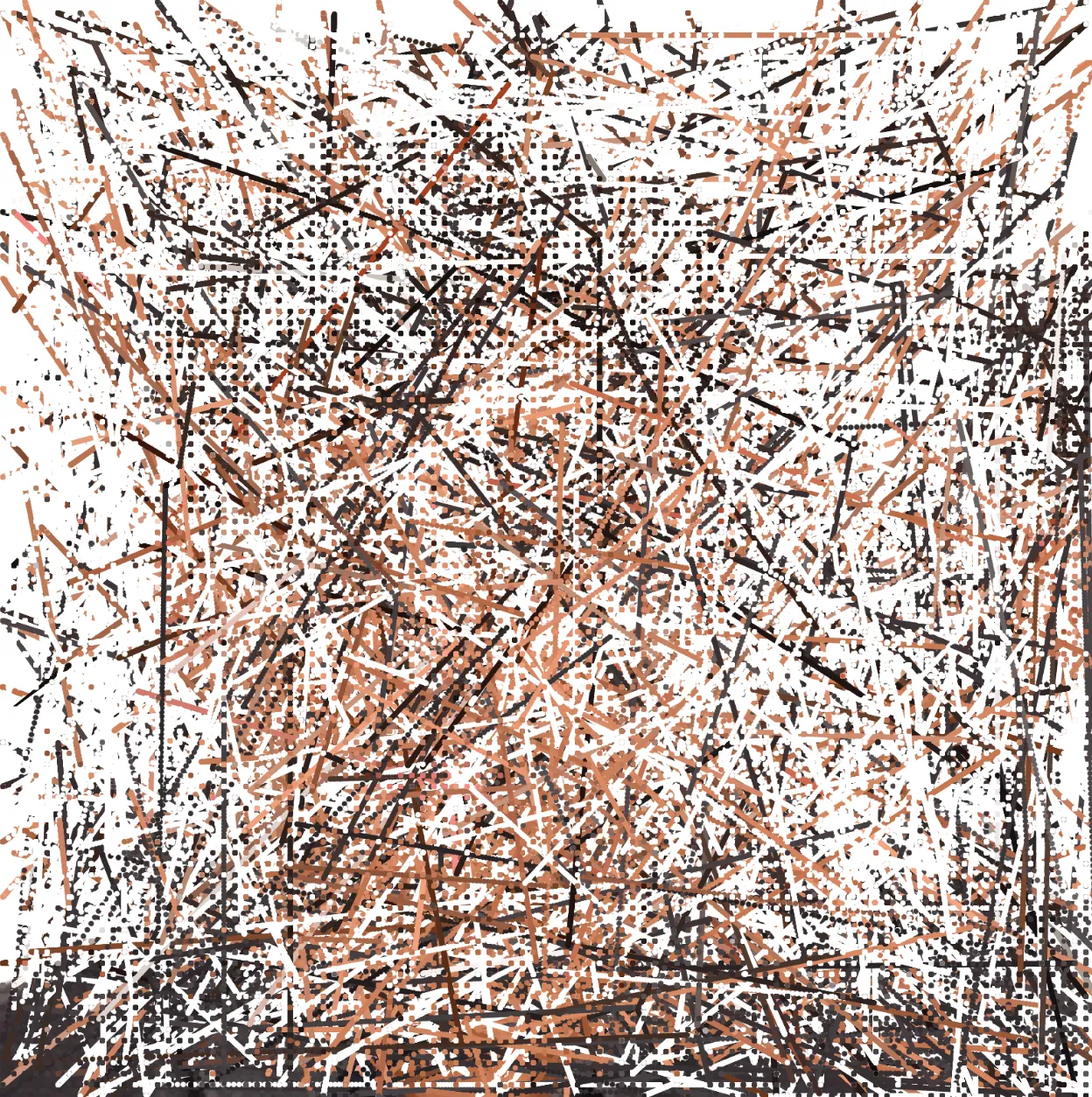
//self-portrait; september 05, 2025.
//use colours from my website:
let cols = [
[253, 253, 253], //bg
[60, 60, 60], //primary
[120, 120, 120], //secondary
[240, 240, 240], //tertiary
];
//the size of the world:
let world_width = 800;
let world_height = 800;
//the world is made up of many people:
let people = [];
//they're all of the same size:
const size = 4;
let photograph; //to use picture later.
//to preload the image, through which people get colour:
function preload() {
photograph = loadImage("/assets/passport-photograph.jpg");
}
function setup() {
//the world is born:
createCanvas(world_width, world_height);
//get colours from the photograph once:
get_colours_from_img(photograph);
//people are born in the world:
const space = size * 2; // people give each other some space.
for (let x = 0 + size; x <= world_width - size; x += space) {
for (let y = 0 + 4; y <= world_height - 4; y += space) {
//i also want to push the colours of my image here. so:
let col = convert_coordinates_to_colour(x,y,photograph)
people.push(new People(x, y, col));
}
}
}
//helper function to get colours from an image in 'pixels' array.
function get_colours_from_img(img) {
img.resize(0, width); //fit the width of the screen.
image(img, 0, 0); //draw from the top-left.
img.loadPixels();
}
//helper function to convert coordinates to colours, as passed down in setup.
function convert_coordinates_to_colour(x, y, img) {
let index = (y * img.width + x) * 4;
let r = img.pixels[index];
let g = img.pixels[index + 1];
let b = img.pixels[index + 2];
let a = img.pixels[index + 3];
return [r, g, b, a];
}
function draw() {
// background(cols[0]);
//each person:
for (person of people) {
//exists:
person.exist();
//moves:
person.move();
}
//people move to take someone's place, or be in someone's place.
let moving_person = people[int(random(0, people.length))];
let static_person = people[int(random(0, people.length))]; //sometimes, the moving and the stationary person are the same. this means you're happy where you are. that's humanely (and probabilistically) rare.
moving_person.destination_x = static_person.x;
moving_person.destination_y = static_person.y;
}
class People {
constructor(x, y, col = [0, 0, 0, 0]) {
this.x = x;
this.y = y;
this.size = size;
this.col = col;
//people have temporary destinations:
// but when they're born, those destinations don't exist.
(this.destination_x = x), (this.destination_y = y);
}
exist() {
strokeWeight(size);
stroke(this.col);
point(this.x, this.y);
}
move() {
this.x = lerp(this.x, this.destination_x, 0.01);
this.y = lerp(this.y, this.destination_y, 0.01);
}
}